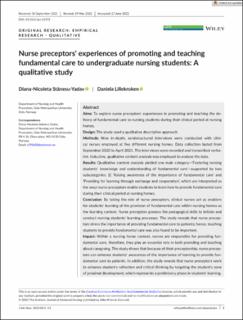| dc.contributor.author | Stanescu-Yadav, Diana-Nicoleta | |
| dc.contributor.author | Lillekroken, Daniela | |
| dc.date.accessioned | 2022-10-03T07:18:45Z | |
| dc.date.available | 2022-10-03T07:18:45Z | |
| dc.date.created | 2022-07-23T21:19:54Z | |
| dc.date.issued | 2022-07-19 | |
| dc.identifier.citation | Journal of Advanced Nursing. 2022, . | en_US |
| dc.identifier.issn | 0309-2402 | |
| dc.identifier.issn | 1365-2648 | |
| dc.identifier.uri | https://hdl.handle.net/11250/3023171 | |
| dc.description.abstract | Aims: To explore nurse preceptors' experiences in promoting and teaching the delivery of fundamental care to nursing students during their clinical period at nursing homes.
Design: The study used a qualitative descriptive approach.
Methods: Nine in-depth, semistructured interviews were conducted with clinical nurses employed at five different nursing homes. Data collection lasted from September 2020 to April 2021. The interviews were recorded and transcribed verbatim. Inductive, qualitative content analysis was employed to analyse the data.
Results: Qualitative content analysis yielded one main category—‘Fostering nursing students’ knowledge and understanding of fundamental care’—supported by two subcategories: (i) ‘Raising awareness of the importance of fundamental care’ and ‘Providing for learning through exchange and cooperation’, which are interpreted as the ways nurse preceptors enable students to learn how to provide fundamental care during their clinical period at nursing homes.
Conclusion: By taking the role of nurse preceptors, clinical nurses act as enablers for students' learning of the provision of fundamental care within nursing homes as the learning context. Nurse preceptors possess the pedagogical skills to initiate and conduct nursing students' learning processes. The study reveals that nurse preceptors stress the importance of providing fundamental care to patients; hence, teaching students to provide fundamental care was also found to be important.
Impact: Within a nursing home context, nurses are responsible for providing fundamental care; therefore, they play an essential role in both providing and teaching about caregiving. The study shows that because of their preceptorship, nurse preceptors can enhance students' awareness of the importance of learning to provide fundamental care to patients. In addition, the study reveals that nurse preceptors work to enhance student's reflection and critical thinking by targeting the student's zone of proximal development, which represents a preliminary phase in students' learning. | en_US |
| dc.language.iso | eng | en_US |
| dc.publisher | Wiley | en_US |
| dc.relation.ispartofseries | Journal of Advanced Nursing; | |
| dc.rights | Attribution-NonCommercial-NoDerivatives 4.0 Internasjonal | * |
| dc.rights.uri | http://creativecommons.org/licenses/by-nc-nd/4.0/deed.no | * |
| dc.subject | Clinical learning | en_US |
| dc.subject | Fundamental care | en_US |
| dc.subject | Nurse preceptors | en_US |
| dc.subject | Nursing homes | en_US |
| dc.subject | Nursing students | en_US |
| dc.subject | Qualitative content analyses | en_US |
| dc.subject | Qualitative studies | en_US |
| dc.title | Nurse preceptors' experiences of promoting and teaching fundamental care to undergraduate nursing students: A qualitative study | en_US |
| dc.type | Peer reviewed | en_US |
| dc.type | Journal article | en_US |
| dc.description.version | publishedVersion | en_US |
| dc.rights.holder | © 2022 The Authors | en_US |
| cristin.ispublished | true | |
| cristin.fulltext | original | |
| cristin.qualitycode | 2 | |
| dc.identifier.doi | https://doi.org/10.1111/jan.15372 | |
| dc.identifier.cristin | 2039209 | |
| dc.source.journal | Journal of Advanced Nursing | en_US |
| dc.source.pagenumber | 13 | en_US |

